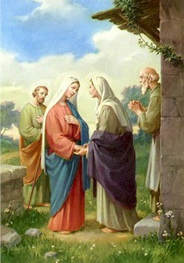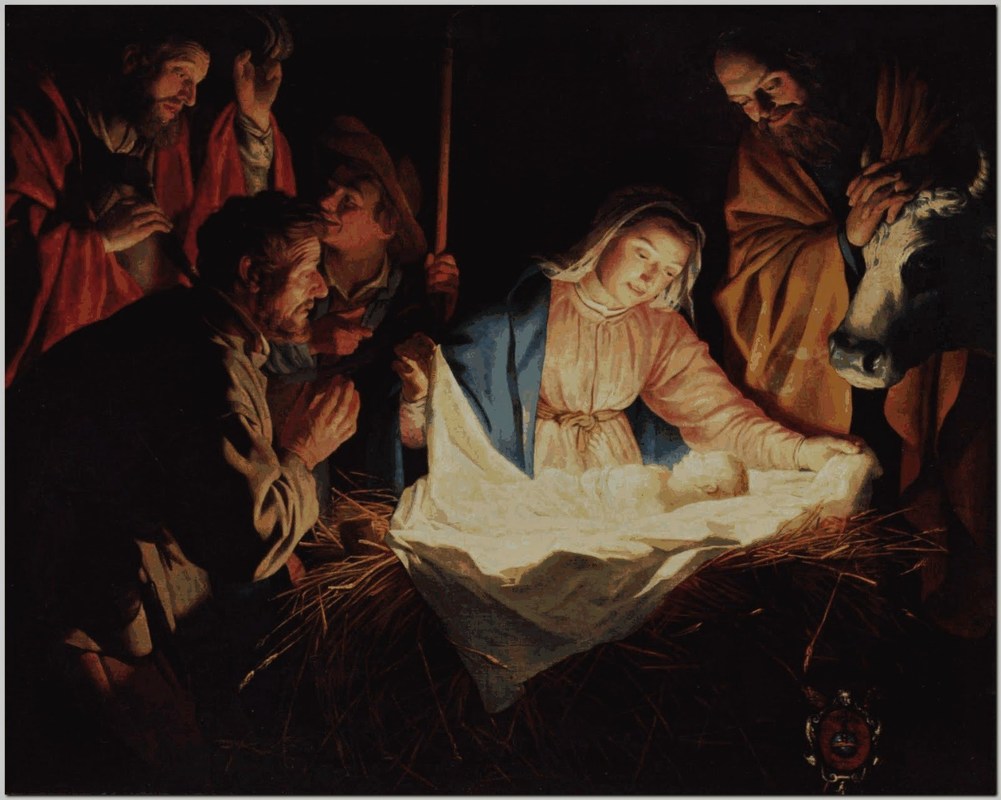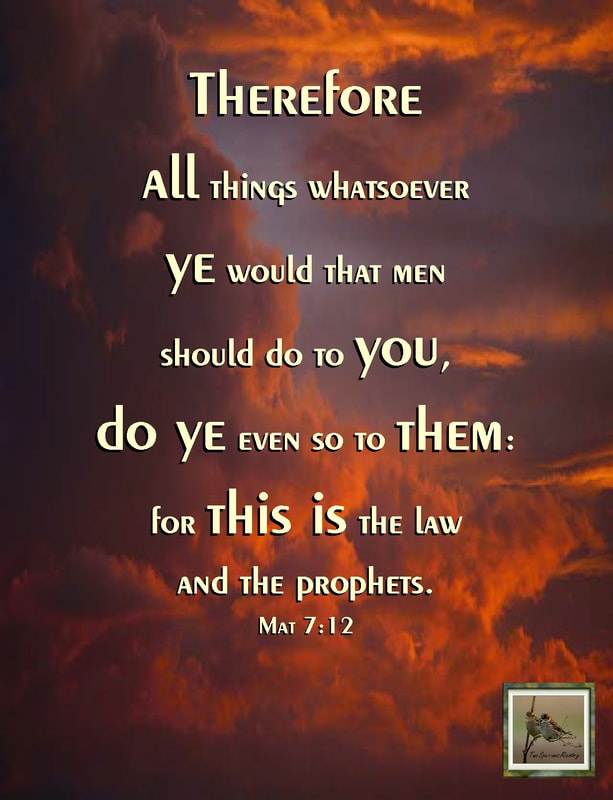
In the book of Isaiah, 700 years before the birth of Christ (760 to 713 b.c.), he proclaims the birth, life and death of Jesus (read ch. 53), in minute detail. Later in the book of Matthew the details of Isaiah's prophecies are substantiated in the events of Mary's virgin conception, and the recorded life of Christ as he fulfilled each prophetic word concerning him.
The commentaries below hold excellent information, and research material to learn the events, and genealogy of Christ.
Isa 7:14 Therefore the Lord himself shall give you a sign; Behold, a virgin shall conceive, and bear a son, and shall call his name Emmanuel.
THE SIGN OF EMMANUEL
A new cycle of prophecy begins here, covering the reign of Ahaz. The complete history which illustrates these chapters is given in 2Ch_28:5. The invasion of Judah by Syria and Samaria was permitted because a severe warning was needed to enforce Isaiah’s remonstrances and appeals. See 2Ki_15:37. The Holy City, as Isaiah predicted, was not to be trodden by the invader, though it would pass through severe suffering and anxiety. This immunity, which neither Ahaz nor his people deserved, was secured by Isaiah’s faith and prayer, pleading as he did, God’s ancient covenant.
This great prophecy of the coming Immanuel must have greatly encouraged that generation, as it has all succeeding ones. It inspired Psa_46:1-11. What greater comfort have we than that Jesus is the companion of our pilgrimage? See Mat_1:21-23. Though the corn-lands were desolate, the cattle on the mountain-pastures would yield butter and the wild bees honey; and this would supply the nation’s needs till the invader had withdrawn. Though God chastens us, He will not forget our daily bread. (F.B. Meyer comm)
Isaiah 7:14
himself — since thou wilt not ask a sign, nay, rejectest the offer of one.
you — for the sake of the house of believing “David” (God remembering His everlasting covenant with David), not for unbelieving Ahaz’ sake.
Behold — arresting attention to the extraordinary prophecy.
virgin — from a root, “to lie hid,” virgins being closely kept from men’s gaze in their parents’ custody in the East. The Hebrew, and the Septuagint here, and Greek (Mat_1:23), have the article, the virgin, some definite one known to the speaker and his hearers; primarily, the woman, then a virgin, about immediately to become the second wife, and bear a child, whose attainment of the age of discrimination (about three years) should be preceded by the deliverance of Judah from its two invaders; its fullest significancy is realized in “the woman” (Gen_3:15), whose seed should bruise the serpent’s head and deliver captive man (Jer_31:22; Mic_5:3). Language is selected such as, while partially applicable to the immediate event, receives its fullest, most appropriate, and exhaustive accomplishment in Messianic events. The New Testament application of such prophecies is not a strained “accommodation”; rather the temporary fulfillment of an adaptation of the far-reaching prophecy to the present passing event, which foreshadows typically the great central end of prophecy, Jesus Christ (Rev_19:10). Evidently the wording is such as to apply more fully to Jesus Christ than to the prophet’s son; “virgin” applies, in its simplest sense, to the Virgin Mary, rather than to the prophetess who ceased to be a virgin when she “conceived”; “Immanuel,” God with us (Joh_1:14; Rev_21:3), cannot in a strict sense apply to Isaiah’s son, but only to Him who is presently called expressly (Isa_9:6), “the Child, the Son, Wonderful (compare Isa_8:18), the mighty God.” Local and temporary features (as in Isa_7:15, Isa_7:16) are added in every type; otherwise it would be no type, but the thing itself. There are resemblances to the great Antitype sufficient to be recognized by those who seek them; dissimilarities enough to confound those who do not desire to discover them.
call — that is, “she shall,” or as Margin, “thou, O Virgin, shalt call;” mothers often named their children (Gen_4:1, Gen_4:25; Gen_19:37; Gen_29:32). In Mat_1:23 the expression is strikingly changed into, “They shall call”; when the prophecy received its full accomplishment, no longer is the name Immanuel restricted to the prophetess’ view of His character, as in its partial fulfillment in her son; all shall then call (that is, not literally), or regard Him as peculiarly and most fitly characterized by the descriptive name, “Immanuel” (1Ti_3:16; Col_2:9).
name — not mere appellation, which neither Isaiah’s son nor Jesus Christ bore literally; but what describes His manifested attributes; His character (so Isa_9:6). The name in its proper destination was not arbitrary, but characteristic of the individual; sin destroyed the faculty of perceiving the internal being; hence the severance now between the name and the character; in the case of Jesus Christ and many in Scripture, the Holy Ghost has supplied this want [Olshausen]. (JFB comm)
Both as a prophet and as a statesman, Isaiah took an active part in the affairs of Judah during the reigns of Uzziah, Jotham, Ahaz, and Hezekiah. He was contemporary also with the prophets, Hosea and Micah. At the lowest estimate his public career extended over a period of forty years. According to tradition he was executed, by being sawn asunder, during the reign of Manasseh, to which there may be reference in Heb_11:37.
Much controversy has gathered around the authorship of the book which bears him name. While there are difficulties in the way of attributing the entire book to a single writer, much more serious problems have been created by every attempt to divide the authorship among different writers.
Isaiah is called the “Evangelical Prophet,” as a large part of his book is indissolubly bound with the life and work of the Messiah. Philip, finding the Ethiopian eunuch reading from this prophecy, “began at the same scripture, and preached unto him Jesus.” The book contains also a wide variety of materials: prophetic oracles concerning the nations, sermons, hymns, apocalypses, narratives, and autobiography. It is commonly regarded as the greatest of the prophecies and its influence upon the development of Christian thought can hardly be overestimated.
The second section of the book, Isa_40:1-31; Isa_41:1-29; Isa_42:1-25; Isa_43:1-28; Isa_44:1-28; Isa_45:1-25; Isa_46:1-13; Isa_47:1-15; Isa_48:1-22; Isa_49:1-26; Isa_50:1-11; Isa_51:1-23; Isa_52:1-15; Isa_53:1-12; Isa_54:1-17; Isa_55:1-13; Isa_56:1-12; Isa_57:1-21; Isa_58:1-14; Isa_59:1-21; Isa_60:1-22; Isa_61:1-11; Isa_62:1-12; Isa_63:1-19; Isa_64:1-12; Isa_65:1-25; Isa_66:1-24, is “one of the finest poems existing in any language.” The author’s aim in this part is to encourage the Israelites in their exile by showing that Jehovah is supreme and that, therefore, no obstacle will be able to prevent the restoration of Israel and the overthrow of their enemies. In accomplishing His purpose, God uses the following agents:
1. Cyrus, “one from the East,” Isa_41:2, who is also called “my shepherd,” Isa_44:28, and Jehovah’s “anointed,” Isa_45:1, and who is to be God’s instrument in overthrowing Babylon and delivering Israel from exile.
2. The “Servant of Jehovah.” In several passages, Isa_41:8; Isa_44:1-2; Isa_44:21, the nation of Israel is the “Servant of Jehovah,” to accomplish His purposes with reference to all peoples, but, in many others, the personal, suffering “Servant of Jehovah” is beautifully pictured as God’s instrument in the redemption of Israel and in the ingathering of the Gentiles. Through Christ, the Messiah, is to be fulfilled God’s promise to Abraham, culminating in an endless Kingdom of peace and righteousness. (F.B. Meyer comm)









